Pamela King Cable's Blog, page 2
August 26, 2013
The Simple Secret To Writing
I've been thinking the more writers read how-to books, web sites, and blogs on writing, the more confused they can become. The more it stifles their energy to sit down and write that next story.
Most writers don't fear the first draft. We know it's a draft. It's not for public consumption. But what happens between writing that first draft and finishing the book? Hoping to find a nugget of truth, we pour over blogs and web sites and books that tell us what we "need to know" about pacing, voice, character development, on and on ... until it stops us in our tracks.
Writers are artists. As a whole, the doubt and fear we battle is like walking into a swarm of hornets. We just know we're going to get bit.

What happens as a result of that fear? If you are a writer, you've felt it. You know what I'm talking about.
But here is something to consider. Even Donald Maass started somewhere. And I'll bet he'll tell you he's still learning.
You've already gathered enough knowledge to write. You know the middle of the story matters, to show and not tell, to kill your darlings and prologues and keep backstory to a minimum. So while you're in the process of creating, as you write your next story, don't read any more blogs, how-to books, or web sites that tell you how to write. STOP IT.
Stop second-guessing yourself. Just write the story. Let it pour out of your heart. Weep over the keyboard. Burn the midnight oil until you've finished the second, even the third draft. Put your soul into it. Then, my writer friend, you have something to work with. To revise. To hone. To make beautiful. Then you can submit for critique, or to a professional editor for revision. Then you can refresh yourself in a how-to book as you EDIT.
Remember, there are a ton of "experts". Intimidation is a monster. Even the most seasoned writer questions their own talent from time to time. The secret is ... get the story out of you first. Overcome the fear of writing by writing for yourself first. It's the simple truth.
Blessings to you and yours.
Most writers don't fear the first draft. We know it's a draft. It's not for public consumption. But what happens between writing that first draft and finishing the book? Hoping to find a nugget of truth, we pour over blogs and web sites and books that tell us what we "need to know" about pacing, voice, character development, on and on ... until it stops us in our tracks.
Writers are artists. As a whole, the doubt and fear we battle is like walking into a swarm of hornets. We just know we're going to get bit.

What happens as a result of that fear? If you are a writer, you've felt it. You know what I'm talking about.
But here is something to consider. Even Donald Maass started somewhere. And I'll bet he'll tell you he's still learning.
You've already gathered enough knowledge to write. You know the middle of the story matters, to show and not tell, to kill your darlings and prologues and keep backstory to a minimum. So while you're in the process of creating, as you write your next story, don't read any more blogs, how-to books, or web sites that tell you how to write. STOP IT.
Stop second-guessing yourself. Just write the story. Let it pour out of your heart. Weep over the keyboard. Burn the midnight oil until you've finished the second, even the third draft. Put your soul into it. Then, my writer friend, you have something to work with. To revise. To hone. To make beautiful. Then you can submit for critique, or to a professional editor for revision. Then you can refresh yourself in a how-to book as you EDIT.
Remember, there are a ton of "experts". Intimidation is a monster. Even the most seasoned writer questions their own talent from time to time. The secret is ... get the story out of you first. Overcome the fear of writing by writing for yourself first. It's the simple truth.
Blessings to you and yours.
Published on August 26, 2013 06:35
August 18, 2013
Constipated Storylines

Here it is, the middle of August. Already. Where did this month go? Couple of family birthdays, mine included. But the bigger news, I've been working on a book proposal for The Sanctum. A literary agent is interested in shopping the book to the Christian publishers. I have to give it that chance. God always opens doors for me; sometimes I miss it, but sometimes I manage to step through it, in spite of myself.
I'm still struggling with the first draft of the next novel, but (and it's a big but) when I decided to get quiet and quit fretting over it, that's when the characters began to talk again. It's taking a new turn, and frankly, I'm surprised at the direction. Moved to tears over the last chapter, I tucked my tail between my legs and said to my protagonist, Okay, I'll shut up. You tell me the story. Use my fingers, and I'll just clean it up when you're done.
That's what happens when your writing hits a detour. A roadblock. You get constipated and it often becomes a test of wills between you and your characters. They always win with me. Eventually. I'm a storyline softie. I think until you understand the disappointments, the pain of life, you're not as open to the rough road of your characters. Writing the story in your head is difficult enough. Adding in the voices of the characters, it adds a new element. You either fight it, or yield to the seduction.
Sometimes I think that's why our writing improves in the midst of our own aging process. When I was younger, everything had to be perfect. Literally everything. Though I still battle with perfection on every level, I find my edges have softened. In my body, and in my writing. I'm not as hard on myself. I'm more open to my fellowman, and in the struggles of my characters. It's a nasty world out there. And as a Christian, I see many who shut their eyes to world Christ told us to save.
Writing reality is not like watching reality shows on TV. That's not real. They know there's a camera in the room. There's a producer on set. It's not real. Reality can only be found in books. Even if it's fiction. Think about it.
Allowing your characters to speak to you is necessary. Detouring from the outline of the story may save the story. Getting quiet is better than giving up. Wouldn't you agree?
Blessings to you and yours.
Published on August 18, 2013 07:42
July 30, 2013
Inconsiderate Writers
"Who me? I'm not in a click!"

There's more than a "good ol' boys" club when it comes to writers and editors. There's something going on that reminds of getting accepted by the popular clicks in high school. Writers who ignore, disrespect, and simply snub other writers and their work. I happen to be "friends" with many writers on Facebook, but there are those few who seldom post comments of encouragement or offer up words on any other writer's wall. Well. Other than those in their click. (I know, it's often spelled clique, but for this blog post, it's click.)
Now we all get busy, we all have deadlines, and it's not possible to post every day and on every wall. But it's become obvious to me. There are writers who love appealing to their readers, but have nothing to do with other writers.
Good God. High School was over decades ago for most of us.
It's not only happening on Facebook. I was asked to speak on a writers panel last year at a very prestigious book conference. There were three female writers on this panel, and unfortunately, I was last to speak. The first writer began to read from her new novel. Thirty minutes into her reading I was about to slip a note to the moderator that said, "Are you going to ask her to stop, or do I have to?" During her reading, half the class got up and left the room, which meant by the time it was my turn to talk about my novel ... there may have been ten people who were brave enough to remain in the room, and about fifteen minutes left before the class ended.
I was furious. But I kept my mouth shut, smiled, and congratulated each author for their work. Months later, I feel it's necessary to talk about writer etiquette, and plain ol' consideration for the other guy. Kindness. Caring. Selflessness.
I've been watching these writer Facebook clicks closely since I woke up one day to realize, that green-eyed monster still lurks among us long after our cap and gown ceremony. It hit me hard between the eyes when I went after blurbs for my latest novel.
If you are ever asked to blurb another writer’s book, I want you to look back and remember your own path …
That author who contacted you obviously believed your name and your words would help the success of their book. They contacted you for a reason. It’s an honor and not to be taken lightly. So when I hear of authors ignoring other writer’s request for a blurb, it makes my blood boil.
You may be busier than a one-armed paperhanger with no time to read even a few sentences of another writer’s work. That’s fine. Understandable. I get it. I’ve been there. But you take the time to return the email, letter, phone call, or Facebook message, and give that writer the courtesy of two minutes of your time. Simply explain why you cannot write a blurb at this time. Easy. Two minutes.
It seems to me, if you’ve been blessed enough to have made it to the top, it's your obligation to turn around, offer your hand, and lift somebody up. It may only be a word of encouragement, but the least you do is offer a heartfelt apology for not being able to read the writer’s work. Their work that that contains the same blood, sweat, and tears that you’ve put into your own work.
Never forget; never forget where you came from, who you are, and the humble spirit you must hold to your heart; a humble spirit to see you throughout your success as a writer. For if you ever lose your humble spirit, then you have no right to complain if the "hand of God" lifts.
There is nothing ruder in this business, nothing more tragic and full of narcissism, than when a writer ignores the direct message, email, or letter from another writer. True, computers crash, emails get lost, people get sick … but when weeks have passed and all of sudden you realize you’ve got an email or message from another author, answer it. There’s no excuse. Kindness changes everything.
I’ve received warm and caring responses, both positive and negative, from NY Times Bestselling authors, as well as other wonderful authors. I’ve also been ignored by some big names in the industry, and strangely enough, some not so big names. I can tell you in all honesty, for those who couldn’t give me the courtesy of return email or Facebook message, I will probably not buy another one of their books or invest any further time in reading their blog or FB posts. But that’s just me. I would never name them, never defame another writer. I leave them to their own conscience.
But those who wrote or called back, regardless of their answer, I immediately fell in love with them, if I wasn’t already. It was the fact that they cared enough to return my email or facebook message. Two minutes. That’s all it took. Two minutes out of their day. For those two minutes they freely gave me, I will continue to read and recommend their work. And I can tell you; I’m not the only writer who feels this way.
Isn’t it the decent thing to do? Isn’t a kind reputation worth two minutes of your time?
We are never that good, never that big, that we have the right to be unkind, uncaring, and plain disrespectful to other writers.
And for crying out loud, you're no longer in high school. Grow up. Offer a little word of encouragement to your Facebook "FRIENDS" ... Writers are ALSO consumers. Never forget that.

There's more than a "good ol' boys" club when it comes to writers and editors. There's something going on that reminds of getting accepted by the popular clicks in high school. Writers who ignore, disrespect, and simply snub other writers and their work. I happen to be "friends" with many writers on Facebook, but there are those few who seldom post comments of encouragement or offer up words on any other writer's wall. Well. Other than those in their click. (I know, it's often spelled clique, but for this blog post, it's click.)
Now we all get busy, we all have deadlines, and it's not possible to post every day and on every wall. But it's become obvious to me. There are writers who love appealing to their readers, but have nothing to do with other writers.
Good God. High School was over decades ago for most of us.
It's not only happening on Facebook. I was asked to speak on a writers panel last year at a very prestigious book conference. There were three female writers on this panel, and unfortunately, I was last to speak. The first writer began to read from her new novel. Thirty minutes into her reading I was about to slip a note to the moderator that said, "Are you going to ask her to stop, or do I have to?" During her reading, half the class got up and left the room, which meant by the time it was my turn to talk about my novel ... there may have been ten people who were brave enough to remain in the room, and about fifteen minutes left before the class ended.
I was furious. But I kept my mouth shut, smiled, and congratulated each author for their work. Months later, I feel it's necessary to talk about writer etiquette, and plain ol' consideration for the other guy. Kindness. Caring. Selflessness.
I've been watching these writer Facebook clicks closely since I woke up one day to realize, that green-eyed monster still lurks among us long after our cap and gown ceremony. It hit me hard between the eyes when I went after blurbs for my latest novel.
If you are ever asked to blurb another writer’s book, I want you to look back and remember your own path …
That author who contacted you obviously believed your name and your words would help the success of their book. They contacted you for a reason. It’s an honor and not to be taken lightly. So when I hear of authors ignoring other writer’s request for a blurb, it makes my blood boil.
You may be busier than a one-armed paperhanger with no time to read even a few sentences of another writer’s work. That’s fine. Understandable. I get it. I’ve been there. But you take the time to return the email, letter, phone call, or Facebook message, and give that writer the courtesy of two minutes of your time. Simply explain why you cannot write a blurb at this time. Easy. Two minutes.
It seems to me, if you’ve been blessed enough to have made it to the top, it's your obligation to turn around, offer your hand, and lift somebody up. It may only be a word of encouragement, but the least you do is offer a heartfelt apology for not being able to read the writer’s work. Their work that that contains the same blood, sweat, and tears that you’ve put into your own work.
Never forget; never forget where you came from, who you are, and the humble spirit you must hold to your heart; a humble spirit to see you throughout your success as a writer. For if you ever lose your humble spirit, then you have no right to complain if the "hand of God" lifts.
There is nothing ruder in this business, nothing more tragic and full of narcissism, than when a writer ignores the direct message, email, or letter from another writer. True, computers crash, emails get lost, people get sick … but when weeks have passed and all of sudden you realize you’ve got an email or message from another author, answer it. There’s no excuse. Kindness changes everything.
I’ve received warm and caring responses, both positive and negative, from NY Times Bestselling authors, as well as other wonderful authors. I’ve also been ignored by some big names in the industry, and strangely enough, some not so big names. I can tell you in all honesty, for those who couldn’t give me the courtesy of return email or Facebook message, I will probably not buy another one of their books or invest any further time in reading their blog or FB posts. But that’s just me. I would never name them, never defame another writer. I leave them to their own conscience.
But those who wrote or called back, regardless of their answer, I immediately fell in love with them, if I wasn’t already. It was the fact that they cared enough to return my email or facebook message. Two minutes. That’s all it took. Two minutes out of their day. For those two minutes they freely gave me, I will continue to read and recommend their work. And I can tell you; I’m not the only writer who feels this way.
Isn’t it the decent thing to do? Isn’t a kind reputation worth two minutes of your time?
We are never that good, never that big, that we have the right to be unkind, uncaring, and plain disrespectful to other writers.
And for crying out loud, you're no longer in high school. Grow up. Offer a little word of encouragement to your Facebook "FRIENDS" ... Writers are ALSO consumers. Never forget that.
Published on July 30, 2013 07:25
July 23, 2013
Can't Take The Heat?
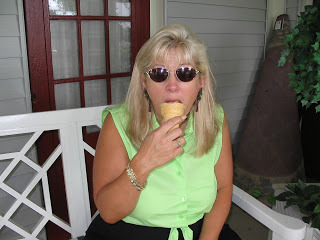
I find myself reluctant to blog during the heat. We live in a century house with no air conditioning, which really isn't much of problem in northeast Ohio except for a week or two a year when the air is so humid you can barely breathe. It's difficult to move around. Cool showers twice a day help, but getting work done is a chore.
Today we woke to find cooler temperatures and I'm reminded of growing up without air conditioning. We didn't think twice about it. Nobody had it. Mom kept big oscillating fans in the kitchen and living room and we stood within inches after an afternoon in the sun, our hands sticky from a cherry Popsicle drip. Glasses of iced Kool-Aid sweat on our shorts. Hair pulled up into ponytails, our sunburned faces knew nothing about sun block. It was the 'sixties and we didn't give a flip about anything other than the next cold bottle of pop and maybe a trip to the local swimming hole.

Sitting here now in my old house with the bees and hornets swarming around the porch, I listen to the sound of summer's wavy heat floating through the screen door. I can't get away from it, I can only drown it out with a fan or two. By the time the trash truck picks up last weeks bags, the cicadas will join in with the bees. I watch the pond evaporate before my eyes. Time for iced tea and egg salad. Heat does a number on my appetite. And my worth ethic. My computer generates too much heat, becomes my typical excuse.
But ... then ... I'm reminded of the summers of my youth, when not even the heat could stop us from building tents over clotheslines and riding miles on our bikes to explore new frontiers. We never thought twice about sex offenders or that there was such a thing. Life was good and sweet and we had not a care or a worry in the world. Not even a skinned knee could stop us from a trip to the store where an electric Coca-Cola sign was the swinging door between worlds. A hand full of Pixie Sticks and cooling green bottles in a metal box was all it took to forget about the oppressive heat.
Since it's cooler today, I'll pound out a few pages. But my mind wants to listen to the giggles of girls, their secrets and their dreams. This next novel is in full swing, and I find that often part of the writing process is allowing your characters to take shape off the page first. This summer's heat is a good excuse to do just that.

Blessings to you and yours.
Published on July 23, 2013 07:47
July 11, 2013
The "Good" Ol' Days!
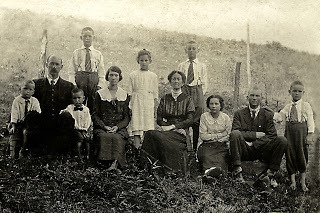
IN 1910
The average life expectancy for men was 47 years.
Fuel for this car was sold in drug stores only.
Only 14 percent of the homes had a bathtub.
Only 8 percent of the homes had a telephone.
There were only 8,000 cars and only 144 miles of paved
roads.
The maximum speed limit in most cities was 10 mph.
The tallest structure in the world was the Eiffel Tower !
The average US wage in 1910 was 22 cents per hour.
The average US worker made between $200 and $400 per year.
A competent accountant could expect to earn $2000 per year,
A dentist $2,500 per year, a veterinarian between $1,500 and
$4,000 per year,
And a mechanical engineer about $5,000 per year.
More than 95 percent of all births took place at HOME.
Ninety percent of all Doctors had NO COLLEGE EDUCATION! Instead, they attended so-called medical schools, many of which were condemned in the press AND the government
as 'substandard.'
Sugar cost four cents a pound.
Eggs were fourteen cents a dozen.
Coffee was fifteen cents a pound.
Most women only washed their hair once a month, and used
Borax or egg yolks for shampoo.
There was no such thing as under arm deodorant or tooth
paste.
Canada passed a law that prohibited poor people from
entering into their country for any reason.
The five leading causes of death were:
1. Pneumonia and influenza
2. Tuberculosis
3. Diarrhea
4. Heart disease
5. Stroke
The American flag had 45 stars.
The population of Las Vegas Nevada was only 30!
Crossword puzzles, canned beer, and iced tea hadn't been
invented yet
There was no Mother's Day or Father's Day.
Two out of every 10 adults couldn't read or write and only 6
percent of all Americans had graduated from high school.
Eighteen percent of households had at least one full-time
servant or domestic help.
There were about 230 reported murders in the ENTIRE U.S.A. !
Published on July 11, 2013 07:43
June 27, 2013
Is There Rhythm To Your Writing?
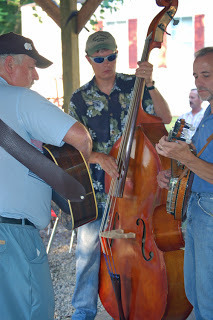
I’ve never written much poetry, nor have I tackled a song
lyric. But I’ve think I’ve been a writer long enough to hear the rhythm in my
prose. Rhythm lends itself to your style, as well as your voice, which are two different things.
Voice is a unique way of putting words together. It's a
deep feeling, a distinctive way of looking at the world, an outlook or belief that
enriches an author’s work. How you develop your voice, to some extent, happens
all by itself. Stories come from the subconscious. What drives you to write is often your own unresolved inner conflicts. Voice is a natural
attribute. You no more control it than you control the color of your eyes.
But don’t confuse voice with style. Style is more about the
writing itself, than the story or characters.
As I write this, I'm thinking maybe rhythm is equally involved in both voice and style.
I’ve been known to work a full week on one paragraph. For me, it must have a
rhythm, a flow, almost like music. To get that, I have to read the paragraph,
or the dialogue, or whatever it is—out loud. If it is dialogue, I must read it
in the voice of the character, therefore, most of my “out loud
reading” is done with no one around to hear me. When a writer reads their work out loud, much of what is corrected is the rhythm, the sound it makes—the music of the
story we create that plays in the background of the reader’s mind. Music
the reader is not aware of, but it’s there. It’s truly there. And sometimes that means adding words.
But here’s a shocker—it may not always be
grammatically correct. Now, don’t get your panties in a wad over this. Writing
in the voice of the character telling the story, the narrator, should always lend itself to
the vernacular and not to the rules of the English language. A good example of
this is in Wiley Cash’s new novel, a land more kind than home. A writer with a Ph.D. in English.
All of this brings me to the age old question, is less really more? Writers, how many times has that been
drilled into your head? It’s a staple of every writer’s conference. We’ve had
it pounded into us for decades now. Less is more. Kill your babies. Slice
your novel in half. Hogwash. I’m here to tell you that may not always be the case. Sometimes,
more is more.
Careful, now. If you accept that, it may change you. Creating rhythm may mean adding words …
From my new novel, The Sanctum (coming soon) …
I wiped condensation from my eyeglasses and shook
the snow from my coat, imagining bulbs of daffodils and hyacinths, sleeping in
her brown flowerbeds, and then blooming come spring.
Winter’s wind blew cruel and steady. An occasional vicious gust burned my face
as it shoved fog off the mountain.
Facing the porch steps, I wiped condensation from my
eyeglasses and shook the snow from my coat. I imagined bulbs of daffodils and
hyacinths sleeping in her brown and dormant flowerbeds, and then blooming come
spring. Greeted by a dozen rocking chairs strewn over the wide porch, I saw
myself sitting in one, drinking lemonade while my grandmother snapped peas. But
at that moment, winter’s wind blew cruel and steady. An occasional vicious gust
burned my face as it shoved the fog across the mountain.
I didn’t feel the flow, the rhythm, the music, until I wrote
the second paragraph with more words. Truly, some editors would prefer the
shorter one, but to me there’s music in the second. Poetry. Balance. The trick
is not to go overboard, but find the balance.
Again, the best way to hear it is to read your work out
loud. You’ll not only catch mistakes, you’ll create the magic needed to hold
your readers in the palm of your hand.
Only you know your characters inside and out. Who they are,
where they came from, and what they think. You must find not only the rhythm of
your character, but within the entire narration. This comes with writing every
day and discovering the rhythm in other great novels. But once you master it,
it will carry your work to a whole new level.
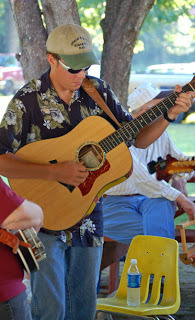
Published on June 27, 2013 08:31
June 23, 2013
Five Year Anniversary!
Where did the time go? Celebrating their 5th Anniversary, my son, Aaron, and his precious wife, Annie, have seen their first five years of marriage come and go. A new house, a new baby girl, they've been immensely blessed. Fraught with the same ups and downs as most of us, they've weathered any storms that blew their way, and have found peace and comfort in each others arms.
"For this cause a man shall leave his father and mother, and shall cleave to his wife; and the two shall become one flesh." Ephesians 5:31
I'm grateful today, looking back. That baby boy I once held in my arms is now holding a precious little one in his own. I'm also eternally grateful for Annie coming into his life. She has blessed us all.
Here's to the next five!
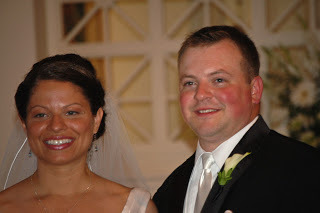
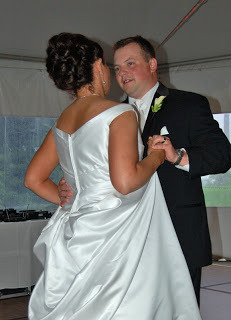
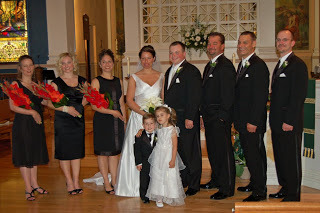

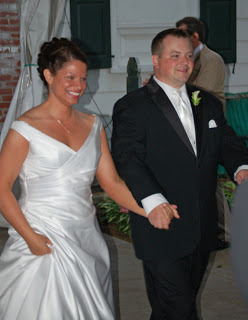
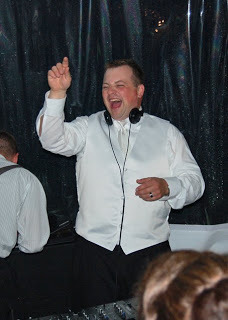
"For this cause a man shall leave his father and mother, and shall cleave to his wife; and the two shall become one flesh." Ephesians 5:31
I'm grateful today, looking back. That baby boy I once held in my arms is now holding a precious little one in his own. I'm also eternally grateful for Annie coming into his life. She has blessed us all.
Here's to the next five!






Published on June 23, 2013 08:30
June 11, 2013
BEA Televenge Anniversary (Writers Are No Longer Intimidated)
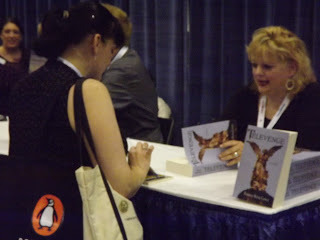
In June 2012, I attended my fourth BEA. I was about to
release my debut novel, Televenge. It's overwhelming as author to stand
in the midst of the Expo madness. It's like your first day of high school. As a
freshman, you either allow the seniors to ignore, intimidate, and taunt you, or
you make your mark early that you're a force to be reckoned with. It's pretty
much that way with the Big Dogs of New York.
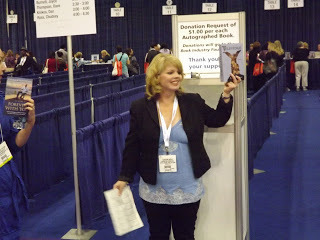
Published by a small, energetic, independent press, (Satya House Publications) Televenge
went to New York with a hopeful group of folks behind it. As a result, my novel
about the dark side of televangelism was an Editor’s Pick at the 2012 Book
Expo, meaning out of the thousands of new books published, the Library Journal
ranked it among the top 28. It also received exceptional reviews from book
bloggers all over the world, from New York Times bestselling authors Lesley
Kagen and Jacquelyn Mitchard, and even Publishers Weekly gave it a boost with a
stellar review.

Published in October 2012, Televenge attracted immediate
national attention from Fox News on numerous occasions, CBS Atlanta, scores of
national media outlets, and a major Hollywood production company.
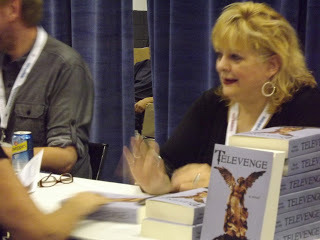
We’ve leveled the playing field. Self-published
authors and those published by small press are the Navy Seals of the publishing
industry. We invade the BEA focused on our mission, and then get out of town
with something to show for it. We’re no longer intimated by the
Big Dogs pushing their books. It’s just that simple.
Published on June 11, 2013 09:06
June 5, 2013
What Do You Offer Your Readers?
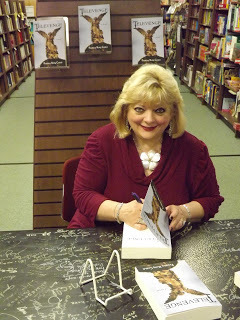
As a writer, I've often wondered what do I offer my readers?
Some authors write lofty volumes of prose, poetic and soothing to the ears. Some keep their readers spellbound
with intrigue or humor. Some carefully perfect the craft of curling
the hair on our neck as we quickly turn the page to discover where the killer hid the body.
Writers who transport us to exotic places, and hold us there; writers who
punctuate their characters, and pierce the heart of the reader deserve to be
noticed. Every once in a while, you run across a writer who can do all of the above. It's rare, but it happens.
Think about it. Is there an author you have read
recently, or years ago, who created characters and a plot that lingered for days. A story that comes to mind at the strangest times. A writer whose novels haunted you for weeks,
years? A writer who consistently moves you like few others? What in their voice
gives them the edge? What common thread weaves their unforgettable stories to
the cloak of your memory? How do they do it?
Besides constantly polishing your craft, I’m finding there’s
another element to this writing thing we do.
How do you share knowledge, life experiences, and
enlightenments within the context of a story? How do you make it matter to your
readers?
Are you able to bring your heartbreak to the page? The pain
of loss, rejection, abandonment, can you write about it? Can you pull from your
most horrific memories, as well as your most joyous? What I’m talking about has
nothing to do with your writing degree or your awards. Although commendable,
that's not it. I’m asking what do you--as a living, breathing, human
being--bring to the page?
This quote is from one of my favorite writers. Dorothy
Allison’s words at the Maui Writer’s Conference were delivered with fire and
fervency.
She said, “I’m here to deliver black coffee, I’m here to
leaven your experience. I’m here to tell you part of why I’m a writer is that
it’s one of the professions where you can be a fat girl and make it! … Writers
come to the page for many, many reasons. In fact, many of us DO come in the
hope of justice, we DO come in the hope of balance, we DO come with an agenda
of love, but I’m TELLING YOU NOW, lots of us start with a desire for genuine
REVENGE.”
So. Does there has to be some deep, dark reason why we
write?
Many write for the fun of it. But once again, in my honest and
humble opinion, the writing that lasts for generations is gathered from the
cobwebbed corners of your mind. Those basements and attics where most writers
fear to tread but go anyway.
What if you write humor?
Ah, yes. Well,
dissect that humor. Much of our humor comes from pain. We're going to laugh
about this later. Laughter through tears is a powerful emotion.
Many believe the angrier you are, the funnier you need to be. Take that to the
page.
Do we, then, write only what we know?
Not just what you know, but what you feel. What you've seen.
The gut-wrenching moments in your life that cut deep into your heart. Write
about that. Write about the scars. Who gave them to you, and how you healed, or
how you still suffer from those scars. Give your character a piece of your life
story that you want to share with the world. Dig out the best and worst of your
memories, and include them in your stories. Write not just what you know, but
what matters. What has brought you out of a deep, dark spot? What makes you
uncomfortable? Write your passions, your desires, and what moves you. Write
that.
Those are the guts of a good story. Bring that to the page. Offer that to your readers.
Published on June 05, 2013 09:02
May 21, 2013
Why Writers Plow Their Literary Field

I took a look back at my blogs and found this one. In the midst of writing The Sanctum, my soul was screaming. I've come a long way since then. I'm proud to say this novel has also come a long way, and will be released as an e-book within a few weeks. This field is now ready for harvest.
April 8, 2010
I've been plowing my literary field this spring. My office is a mess. I've
written scenes for my next novel; they're splayed across a long, skinny table as
I work relentlessly on this story. I'm concentrating on my research and pulling
it in as needed. In a few weeks I'm visiting a wolf sanctuary. If my suspicions
are correct, wolves are not what they have been portrayed. A critical piece of
the narrative, the wolves represent the strange and the misunderstood. That
which needs protected. Not destroyed.
As I roll deeper into the story,
I'm finding--once again--my characters have voices of their own, totally
separate and apart from mine. It's a bizarre metamorphosis. I look down and suddenly my
fingers are those of a thirteen-year-old girl, fair and fragile. Within minutes,
they turn old and masculine. They're covered with tobacco that clings to my arms
like pine resin. They belong to a black man who types as fast as the wind. He's
got a few things to say. Because it's 1960, and the times, they are a
changing.
A scene change and my hands belong to another character.
They're slow and angry, and hot to the touch. Dangerous. They belong to a man,
this time he's white and wrinkled. The fingers pound the keys and occasionally
they ball into a fist. But just like that, they fade into another set of hands
and suddenly I'm needing to get up and find my own fingers again. I need coffee.
A break. It's not easy allowing these characters to flow through you and come
out your fingers. It's not easy.
I have to laugh. I think I've read and
studied every good book on writing from here to eternity in the past twenty years. But
nobody can teach you how to tell a great story. Don Maass has come about as close to anybody
I've heard, but in the end ... I've learned it's almost a spiritual thing. My
explanation is that we have to become somebody else.
We have go inside the man/woman/boy/girl/animal we're writing about. Look at the world from their eyes. A good storyteller can
write it down and make it believable. But a great storyteller can
become his or her character and make it real. I can only hope
that in the end, that is my accomplishment.
One does not write to fulfill
a fantasy. Or to become rich. A
real writer writes until their eyes dim and burn, until their skin goes puckered and droopy, until their finger bones unhinge and scatter. Until they shrivel up and fade away. Take away a writer's pencil or
keyboard, and you strip the soul away. A writer is many people, patiently
waiting for their turn to tell their story. A real writer writes because if they don't, they go mad and become a conglomerate of all of the characters stored inside them.
That's it. It's how God made
me. I can't help it. I plow my literary field and life goes on. Until one day
when it stops. Hopefully, by then, every character inside of me will have had
their chance to use my fingers.
Blessings to you and yours.
Published on May 21, 2013 10:55
Pamela King Cable's Blog
- Pamela King Cable's profile
- 54 followers
Pamela King Cable isn't a Goodreads Author
(yet),
but they
do have a blog,
so here are some recent posts imported from
their feed.



